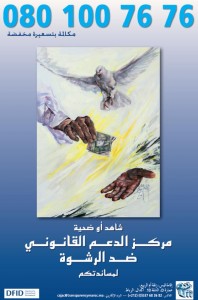Since January 2009, TI’s chapter in Morocco is providing legal advice to citizens. Here’s the account by Mohamed Ali Lahlou, the Coordinator of the Advocacy and Legal Advice Centre, of a press conference to present the results of activities covering the period from January 2009 until May 2010 on 13 July. Le rapport est disponible en français.
 In the first intervention, Mr Rachid Filali Meknassi, Secretary General of Transparency Maroc, said the press conference aims to present a review of the activities carried out by the Advocacy and Legal Advice Centreto the public and the media after more than one year of existence. He reminded that its mission is to receive complaints brought forward by citizens, study their cases, and provide them support through legal assistance to be able to denounce acts of corruption. My presentation focused on reviewing these activities.
In the first intervention, Mr Rachid Filali Meknassi, Secretary General of Transparency Maroc, said the press conference aims to present a review of the activities carried out by the Advocacy and Legal Advice Centreto the public and the media after more than one year of existence. He reminded that its mission is to receive complaints brought forward by citizens, study their cases, and provide them support through legal assistance to be able to denounce acts of corruption. My presentation focused on reviewing these activities.
The Centre received 536 complaints during this period and followed up on 299 cases. The complaints were related to the solicitation of bribes to access a particular service, the disregard and lack of transparency of administrative procedures by the authorities, malfunctions of the judicial system, and the lack of transparency in the private sector. The Centre has been successful in, for example, supporting a citizen who was negated a permit to run a car wash by the Municipal Council. Through the advise of the Centre, the citizen was able to appeal at a higher level, the Administrative Court, that reversed the decision. In another case, the courts have seized the case of corrupt activity at a wholesale market after a merchant denounced it. Given its importance, the Centre is committed to monitor the process and propose actions as necessary.
While actions have been undertaken with key governmental and public institutions to follow up on issues raised by citizens through the Centre, its effectiveness depends both on the ability to promote a culture of denunciation among the citizens, as well on the willingness of different administrations and public institutions to support its work in responding to requests that they forward.
As such, the major constraints facing the Centre today are linked primarily to the lack of response from the authorities regarding complaints made to them. There is therefore a risk that the Centre may lose credibility when it fails to support the plaintiffs in their actions, especially as citizens face great difficulties in following official procedures within the judicial system and often fear retaliation by the authorities against whom they have raised a complaint after receiving legal advice. This shows that the problem of protecting witnesses and whistleblowers of corrupt acts is acute. At the same time, legislative intervention remains essential.
Finally, I presented the communication strategies undertaken by the Centre since its inception. The number of complaints received during and following radio campaigns usually showed a remarkable increase. The conference was covered by TV and radio channels and received good coverage in newspapers. Members of Transparency Morocco gave interviews to newspapers, national radio stations and television. During the days following the event, the number of complaints grew significantly, highlighting once again the relevance for raising awareness to the activities of the Centre.















 Connect with us on Facebook
Connect with us on Facebook Follow us on Twitter
Follow us on Twitter